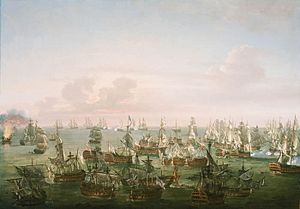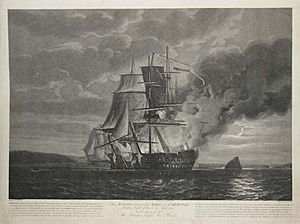HMS Mars (1794) facts for kids

In this painting of the Battle of Trafalgar by Nicholas Pocock, Mars is in the right foreground, just behind the captured Spanish ship Bahama.
|
|
Quick facts for kids History |
|
|---|---|
| Name | HMS Mars |
| Ordered | 17 January 1788 |
| Builder | Deptford Dockyard |
| Laid down | 10 October 1789 |
| Launched | 25 October 1794 |
| Fate | Broken up, 1823 |
| Notes |
|
| General characteristics | |
| Class and type | Mars-class ship of the line |
| Tons burthen | 1,842+24⁄94 bm |
| Length | 176 ft (54 m) (gundeck) |
| Beam | 49 ft (15 m) |
| Depth of hold | 20 ft (6.1 m) |
| Sail plan | Full-rigged ship |
| Armament |
|
HMS Mars was a powerful warship of the Royal Navy. She was a 74-gun third-rate ship of the line, meaning she carried 74 cannons and was a large, important warship. Mars was built at Deptford Dockyard and launched on October 25, 1794.
Contents
Adventures of HMS Mars
Early Battles and Challenges
When the French Revolutionary Wars began, Mars joined the Channel Fleet. This fleet protected Britain's waters. In 1797, under Captain Alexander Hood, Mars was involved in the Spithead mutiny. This was a time when sailors protested for better pay and conditions.
In 1798, Mars fought a famous battle against the French ship Hercule. This happened near the coast of Brittany in the evening. Hercule tried to escape, but the tide stopped her. This gave Captain Hood a chance to attack. Both ships were strong, but Hercule was new and not fully ready. After a fierce fight lasting over 90 minutes, Hercule surrendered. She had lost more than 300 men. On Mars, 31 sailors were killed and 60 were wounded. Sadly, Captain Hood was among those who died.
Fighting at Trafalgar
Mars also took part in the famous Battle of Trafalgar. This huge naval battle happened in 1805. During the fight, Mars faced fire from five different French and Spanish ships. She was badly damaged in the battle. Among the 29 sailors killed and 69 wounded was her captain, George Duff.
Later Service
After Trafalgar, Mars continued to serve in the Channel fleet in 1806. She helped capture four French ships in an action off Chasseron. Later, she served near Portugal and in the Baltic Sea.
What Happened to Mars?
From 1813, Mars was placed in ordinary. This means she was kept in reserve, not actively sailing. She was finally taken apart, or broken up, in 1823.
 | Aurelia Browder |
 | Nannie Helen Burroughs |
 | Michelle Alexander |


